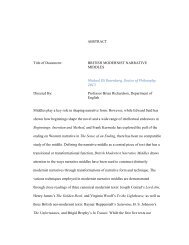PSYCHOTHERAPY ENGAGERS VERSUS NON-ENGAGERS
PSYCHOTHERAPY ENGAGERS VERSUS NON-ENGAGERS
PSYCHOTHERAPY ENGAGERS VERSUS NON-ENGAGERS
Create successful ePaper yourself
Turn your PDF publications into a flip-book with our unique Google optimized e-Paper software.
therapy service at the university (the results may not apply to long-term therapy settings),<br />
and the statistical methods may be confounded by differing levels of therapist verbal<br />
activity (i.e. some therapists talk more than others) since the analyses were based on raw<br />
numbers of the helping skills used rather than percentages.<br />
Adult Attachment Style: A Meta-Analysis<br />
In this section, I summarize a recent meta-analysis of adult pre-treatment<br />
attachment style and psychotherapy outcome conducted by Levy, Ellison, Scott, and<br />
Bernecker (2011). The definition of adult attachment categories used in Levy et al. was<br />
based on the two underlying dimensions of attachment organization: anxiety and<br />
avoidance. An anxiously attached adult tends to have fears of abandonment by important<br />
people in his/her life and tends to worry about his/her significant relationships (Brennan,<br />
Clark, & Shaver, 1998). An avoidantly attached adult tends to avoid closeness with<br />
important people in his/her life, and does not like to depend on others (Brennan et al.,<br />
1998).<br />
Levy et al.’s meta-analysis included 19 separate therapy samples from 14 studies,<br />
with a combined N of 1,467. This sample included clients with a variety of diagnoses and<br />
presenting problems, including but not limited to: major depression, borderline<br />
personality disorder, marital problems, and post-traumatic stress disorder. Clients were a<br />
variety of ages (the average client age in the 14 individual studies ranged from 24.6 to<br />
44.98 years), and included both males and females (percentages of females in individual<br />
studies ranged from 0 to 100). Therapists in the meta-analysis had various theoretical<br />
orientations, including cognitive-behavioral, psychodynamic/interpersonal, eclectic, and<br />
integrative. Therapy treatment duration ranged from 6 to 52 weeks in individual studies<br />
60

















